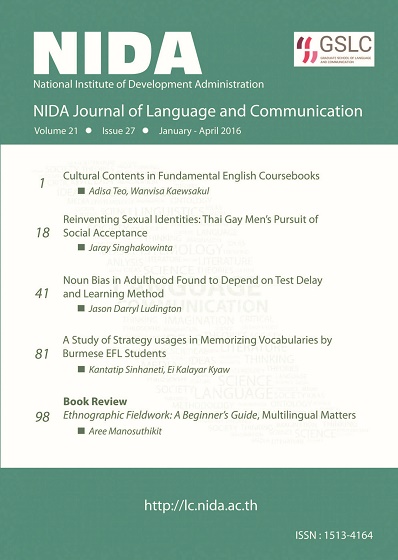Noun Bias in Adulthood Found to Depend on Test Delay and Learning Method
Keywords:
noun learning bias, adult L2 learning, vocabulary meaning recognitionAbstract
Among adults learning a foreign language, might nouns be easier to learn than verbs? A noun learning bias is characteristic of child learners across most languages (e.g., Gentner, 1982), but few studies have tested for such a word class learning bias among adults learning a foreign language. To test adult susceptible to a noun bias, I trained 84 participants with novel names of 96 familiar, concrete concepts (half nouns, half verbs) by ostensive and inferential training methods, and tested vocabulary word recognition at five minutes and at one week. I tested a number of stimulus features which literature suggested could be of importance to word learnability (23 factors in total). This led to the development of a controlled test of the influence of word class apart from other contributing factors on learnability. There appears little evidence of a generalized noun bias in adulthood—a noun bias was found but was specific to ostensive training, tested five minutes but not one week later. Word imageability and image quality also contributed to vocabulary meaning recognition. Results support a theory of word learning that emphasizes referential clarity. Also discussed is the possibility of recognition likelihood as a dynamic construction.
Downloads
How to Cite
Issue
Section
License
By submitting a manuscript, the author transfers the copyright for the article to School of Language and Communication, National Institute of Development Administration (NIDA), if and when the manuscript is accepted for publication. Though the journal is an open-access, reproduction of any material published in NIDA Journal of Language and Communication for non-personal and/or commercial purpose requires a written permission from School of Language and Communication, National Institute of Development Administration (NIDA).






